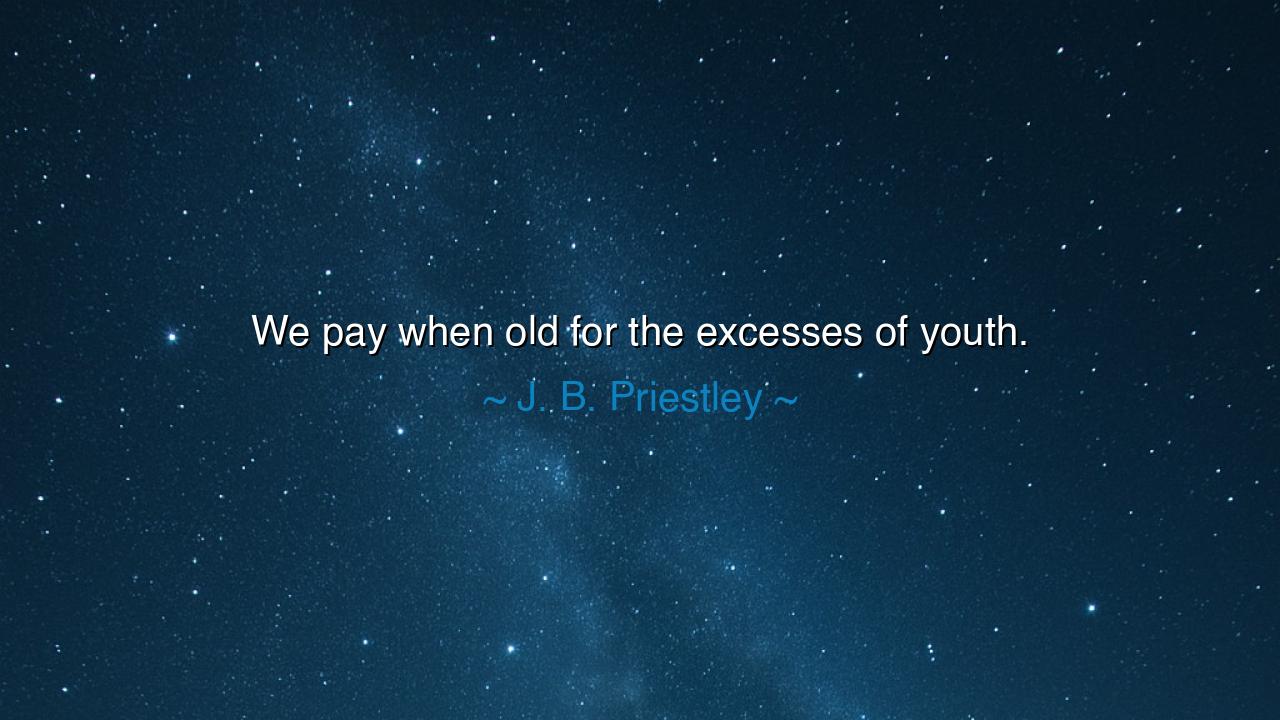
We pay when old for the excesses of youth.






"We pay when old for the excesses of youth." These words, spoken by the wise J. B. Priestley, hold within them a truth as old as the hills and as deep as the seas. They speak of a law that governs the soul of man—a law of cause and effect, a law that cannot be evaded by pride or by ambition. The youthful heart, full of fire and daring, seeks to taste all that the world offers, often without thought of the cost. But heed this, O seekers of wisdom: what is sown in the wild, carefree days of youth is reaped in the quiet, aching years of age. Youth’s excesses are not without consequence; they come to claim their due when the body has grown weary, and the spirit, once so untamed, finds itself burdened.
The passion of youth, like a river rushing toward the sea, is powerful and irresistible. The heart is drawn toward pleasures, indulgences, and temptations that seem without end. Youth, in its vigor, feels immortal, unchained by time’s hand. But age—age is a different matter. The bones ache, the heart grows slower, and the consequences of youthful folly become painfully evident. It is then, in the quiet of twilight years, that the soul reflects on the choices made, and the excesses of the past weigh heavy upon it. The pleasures sought in the past become the burdens borne in the present. We pay, when old, for the excesses of youth.
Let us look to the ancient tales of the mighty and the proud, who, in their youth, lived as though the world could not touch them. Consider the great Alexander the Great, whose ambition burned brighter than the sun itself. He sought glory, power, and conquest with a fervor that left no room for restraint. Yet, in the later years of his life, as his body began to falter, as his spirit grew weary from the endless wars and indulgences, he faced the cost of his youthful passions. The very excesses that had propelled him to greatness in his early years became the chains that bound him in his later life, leaving him broken and seeking solace in a world that had moved on. His life is a testament to the truth that what we do in youth often determines the shape of our old age, for the seeds of folly and excess can sprout into regrets that last a lifetime.
Now, O children of wisdom, let us speak not of kings and conquerors alone, but of the everyday souls who tread this earth. Think of the reckless youth who, in the fire of their years, seeks pleasure in excess—whether it be in drink, in passion, in greed, or in any other indulgence. In their pursuit, they may feel invincible, as though time bends to their will. But when the years pass, and the body grows frail, they are left to face the consequences of their actions. The liver, once youthful and strong, rebels against the indulgence. The heart, once eager for adventure, falters beneath the weight of excess. It is then that they understand, too late, that the debt is paid in the currency of pain, regret, and the toll of a body worn out before its time.
The wisdom here, O children, is that moderation and restraint must be practiced in youth, not for the sake of sacrifice, but for the sake of the future. The true strength of a soul is found not in the pursuit of every pleasure or in the hedonistic indulgence of the body, but in the wisdom to know when enough is enough. The young may think that life is for the taking, but life, in its truest sense, is a balance—a balance between passion and restraint, between seeking and conserving. The choices you make in the fire of youth will shape your years to come. Seek to build a life not just of experiences, but of wisdom and temperance. Only then can you hope to walk gracefully into your later years, unburdened by the weight of your youthful excesses.
Let us consider the story of the great philosopher, Diogenes of Sinope, who, though a man of unrestrained eccentricity and simplicity, understood the cost of excess in his youth. Diogenes lived a life of self-discipline and asceticism, rejecting the pleasures of the material world in favor of simplicity. He, too, in his youth had tasted the fruits of indulgence and excess, but through wisdom and experience, he came to understand the importance of living in harmony with nature and oneself. In his later years, he was not burdened by regret or illness, for he had paid his dues early, living within the balance that the soul requires. His life stands as a beacon to those who would seek to avoid the excesses of youth—to live not in reckless abandon, but in thoughtful, deliberate action.
And so, O children of time, let the lessons of the past guide you. Let the choices of your youth be tempered by wisdom, not driven by the fleeting desires that seek only to fulfill the body’s whims. You are called to be the stewards of your future, for the seeds you plant in the spring of your life will bear fruit in the winter of your years. Pay attention, for the excesses of youth will find you out. The time to act with moderation and foresight is now, while your spirit is young and your strength is at its height. Live wisely, and you shall grow old with grace, not burdened by regret, but crowned with the dignity that comes from living a life in balance.






AAdministratorAdministrator
Welcome, honored guests. Please leave a comment, we will respond soon